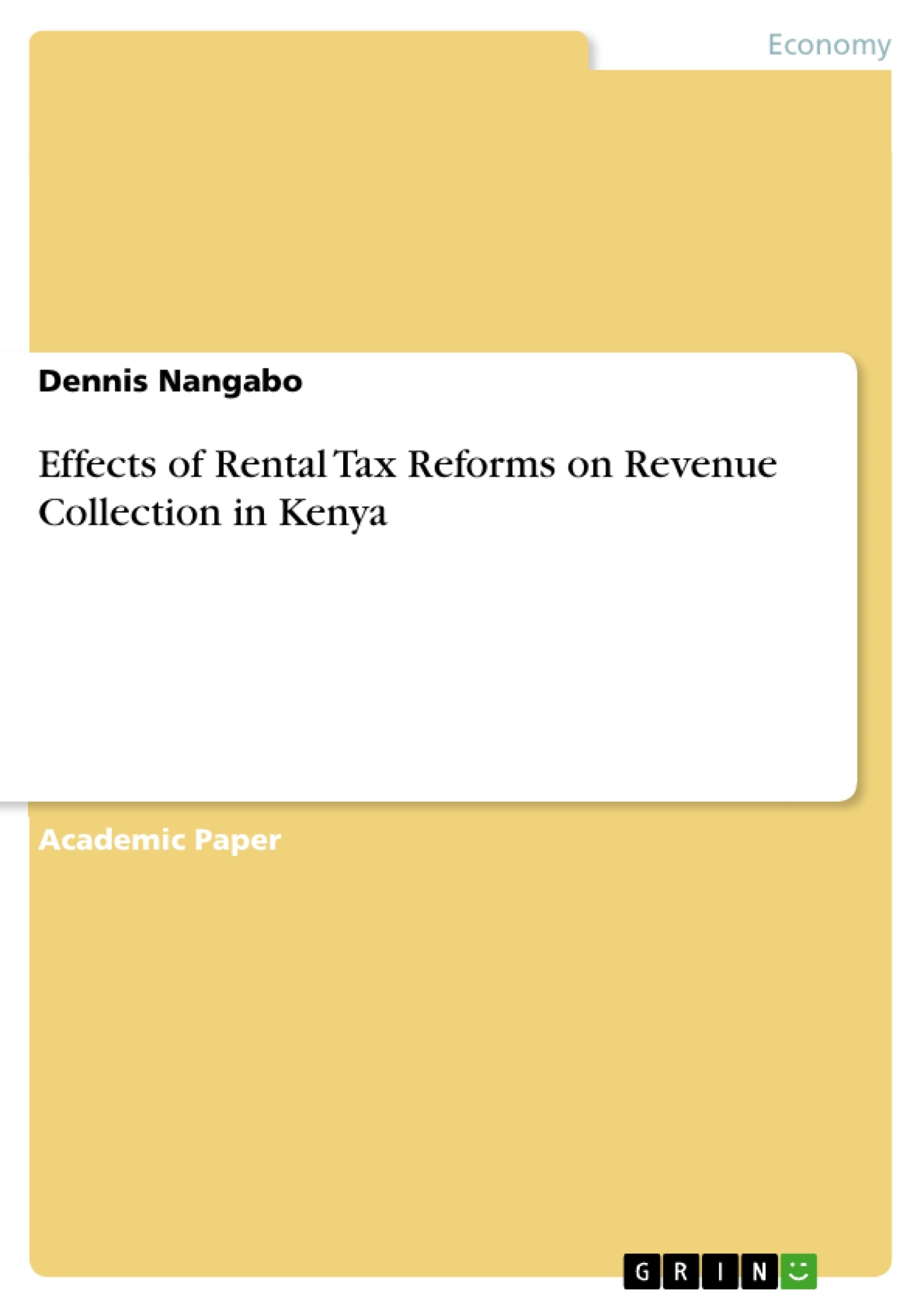Taxes play a crucial role in the development of a nation. In Kenya, tax revenues have always failed to reach the anticipated collection targets due to many factors. The taxman has had to develop policies that aim at reforming tax management and achieve the set targets In this regard the researcher seeks to study the effects of rental tax reforms on revenue collection by the Kenya Revenue Collection agency as the main objective. The specific objectives of this study are; to identify the effect of monthly rental income on rental revenue collection, to determine the effects of withholding rental income on rental revenue collection, to find out the effect of tax amnesty on rental revenue collection and to investigate the effect of block management systems sector on rental revenue collection The study is guided by the dynamic theory of public spending, taxation, and debt and the technological advancement theory. An empirical review is also undertaken to link the independent variables to revenue collection and the research gaps arising. The study shall adopt a descriptive research design and a case of KRA shall be carried out. The target population is 500 employees and a sample size of 81 has been obtained for this matter. Questionnaires shall be used to gather primary data whereas secondary data shall be obtained from KRA, the Ministry of Finance and other relevant entities. The data shall then be analysed using IBM SPSS version 20.0, classified, tabulated and summarized using figures, summary statistics of the mean, and standard deviation percentages and frequency distribution tables. A detailed explanation of the data shall also accompany the presentation.
Inhaltsverzeichnis (Table of Contents)
- ABSTRACT
- CHAPTER ONE
- INTRODUCTION
- 1.1. Chapter Overview
- 1.2. Background of the Study
- 1.2.1. Tax Reforms
- 1.2.1.1. Administrative Tax Reforms in Kenya
- 1.2.1.2. Policy Tax Reforms in Kenya
- 1.2.1.3. Technological Tax Reforms
- 1.2.1.4. Tax Reforms on Rental Income
- 1.3. Statement of the Problem
- 1.4. Objectives
- 1.4.1. General Objective
- 1.4.2. Specific Objectives
- 1.5. Research Questions
- 1.6. Justification of the Study
- 1.7. Scope of the Study
- CHAPTER TWO
- LITERATURE REVIEW
- 2.1. Introduction
- 2.2. Theoretical Literature Review
- 2.2.1. Technological Determinism Theory
- 2.2.2. Dynamic Theory of Public Spending, Taxation, and Debt
- 2.3. Empirical Literature Review
- 2.3.1. Monthly Rental Tax Income
- 2.3.2. Withholding Income
- 2.3.3. Tax Amnesties
- 2.3.4. Block Management System
- 2.4. Research Gaps
- 2.5. Conceptual Framework
- REFERENCES
- Impact of Rental Tax Reforms on Revenue Collection
- Analysis of the Effectiveness of Different Tax Reform Strategies
- Exploring the Role of Technological Advancements in Tax Management
- Evaluation of the Kenya Revenue Authority's (KRA) Revenue Collection Performance
- The Significance of Tax Reforms in Ensuring Fiscal Sustainability
- Chapter One: Introduction - This chapter provides an overview of tax reforms and revenue collection in Kenya. It establishes the research problem, outlines the study's objectives, research questions, justification, and scope.
- Chapter Two: Literature Review - This chapter explores relevant theoretical and empirical literature on tax reforms, revenue collection, and related concepts. It reviews the technological determinism theory, the dynamic theory of public spending, taxation, and debt, and examines studies on monthly rental tax income, withholding income, tax amnesties, and block management systems.
Zielsetzung und Themenschwerpunkte (Objectives and Key Themes)
The study aims to investigate the effects of rental tax reforms on revenue collection in Kenya. It seeks to determine the impact of various reforms, including monthly rental income, withholding rental income, tax amnesty, and block management systems, on the overall revenue collection by the Kenya Revenue Authority (KRA).
Zusammenfassung der Kapitel (Chapter Summaries)
Schlüsselwörter (Keywords)
The study focuses on the key concepts of tax reforms, revenue collection, rental income, Kenya Revenue Authority (KRA), fiscal sustainability, technological advancements, and empirical research.
- Citar trabajo
- Dennis Nangabo (Autor), 2019, Effects of Rental Tax Reforms on Revenue Collection in Kenya, Múnich, GRIN Verlag, https://www.grin.com/document/536251



